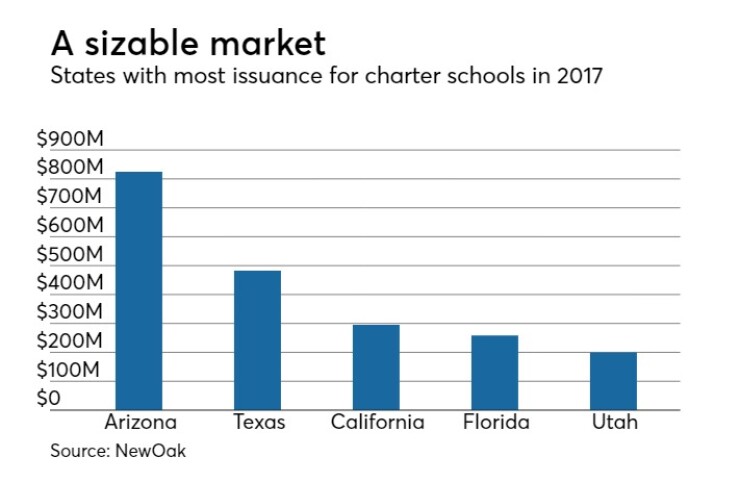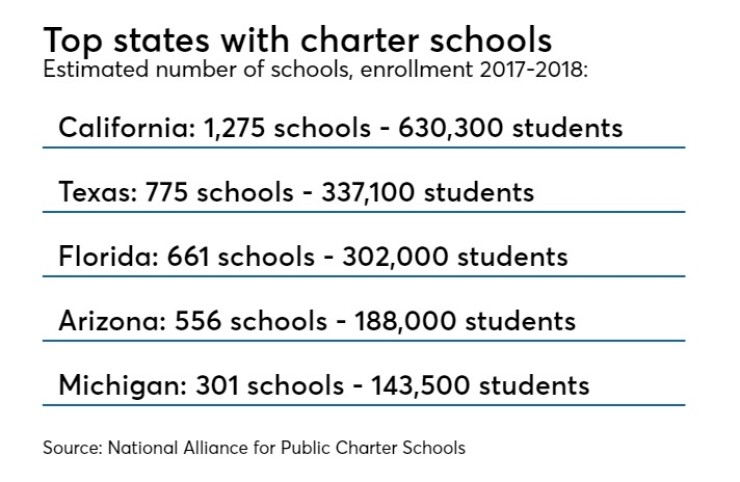Florida has the third-most charter schools of any state, and a constitutional amendment on its November ballot would give the industry new paths to expand.
The problem, according to a

The League's lawsuit asks for the amendment to be stripped from the Nov. 6 ballot.
The wording would open the door for the approval of charter schools and other innovative educational facilities by authorizing agencies other than Florida's 67 public school districts to approve them. At present, charters must be authorized by a school district.
The measure is bundled in the same proposed amendment with two other less controversial school-related changes, and does not clearly inform voters why it has been proposed, said League President Patricia M. Brigham.
“Fortunately, our constitution provides for court review of ballot language to ensure that voters understand the changes they are being asked to make to their constitution,” Brigham said. “The Amendment 8 language is blatantly, and unconstitutionally, misleading.”
The Constitution Revision Commission placed Amendment 8 and seven other amendments on the ballot May 9 after more than a year of public hearings and meetings. The CRC is convened every 20 years to propose changes to the state constitution.
The six words that would be added in Amendment No. 8 “do not, in clear and unambiguous language, fairly inform the voters of a chief purpose of the revision,” according to the League’s 14-page lawsuit filed in the Leon County Circuit Court.
The League contends that the amendment can’t be submitted to Florida voters because accompanying information designed to explain the amendment doesn’t mention that the resulting change would allow charter schools to bypass local school districts for authorization.
“The ballot title and summary fail to inform voters that a chief purpose of the [constitutional amendment]…is to eliminate the long-standing, exclusive authority of local elected school boards to operate, control, and supervise all public schools, including charter schools, in their respective school districts,” the complaint said.
From the language proposed by the CRC, Brigham said voters won’t recognize “that the real purpose of the amendment is to allow unaccountable political appointees to control where and when charter schools can be established in their county.
“We know that Floridians overwhelmingly support the constitutional requirement to make adequate provision for the education of all children that is uniform, efficient, safe, secure and high quality,” she said. “We are asking the court to ensure that voters aren’t tricked into eliminating those protections.”
Florida had 661 charter schools with 302,000 students enrolled for the 2017-2018 school year, according to estimates by the National Alliance for Public Charter Schools.
That is the third-largest number of charter schools of any state. Charter schools, independently run public schools, are permitted in 44 states and the District of Columbia.
California had the largest number of charter schools, 1,275 with 630,000 students enrolled, followed by Texas in second-place with 337,100 students in 775 charter schools.
In 2017, Florida charter schools issued $258 million of revenue bonds, the fourth-highest amount of financing among states, according to capital market advisory firm NewOak. The figure does not include amounts by charter schools that used out-of-state conduit issuers to access the market, NewOak said.
The CRC had 37 board members appointed by Gov. Rick Scott, a Republican, and other top elected officials from the GOP-led Legislature.
The panel can place proposed constitutional amendments directly on the ballot. Each amendment must get 60% of the votes cast to be approved.
Brigham said her organization “repeatedly shared” concerns with the CRC regarding the bundling of multiple proposals within each amendment.
Amendment 8 logrolls three separate provisions into one ballot question.
The first measure would institute term limits on school district board members. It states that “a person may not appear on the ballot for re-election to the office of school board if, by the end of the current term of office, the person would have served, or but for resignation would have served, in that office for eight consecutive years.”
The second provision would add the following six underlined words to the constitution: "The school board shall operate, control, and supervise all free public schools established by the district school board within the school district and determine the rate of school district taxes within the limits prescribed herein."
The third would require that civic literacy be taught in schools.

Since 1968, the Florida Constitution has required that “the school board shall operate, control, and supervise all free public schools within the school district and determine the rate of school district taxes.”
The League’s suit says “the ballot title and summary…were deliberately crafted and sequenced so as to fail to inform voters that the revision actually consists of three distinct, unrelated proposals, and to conceal from voters the chief purpose of the portion…pertaining to the authority of local elected school boards.”
The school district proposal was sponsored by CRC board member Erika Donalds, an elected member of the Collier County School Board and a charter school founder.
According to the suit, which quotes from transcripts of CRC meetings, Donalds drafted language for Amendment 8 to “allow the Legislature flexibility to create alternate processes to authorize the establishment of public schools within our state.
“It purported to remove the mandate that all public schools within a district be operated, controlled and supervised exclusively by the elected local school boards,” the suit said. The proposal would “enable the Legislature to devise a method of creating and operating new public schools with no input from or participation by the local school boards [or] school districts” where the schools are located or from local electors.
The debate over the amendment, the suit said, revealed an intention to create additional paths that would eliminate the role of local school boards in the establishment and supervision of new charter schools and potentially other new kinds of public schools.
Donalds also proposed the provision that would impose term limits on school board members. The proposal to require civic literacy be taught in schools was sponsored by Commissioner Don Gaetz, a former state senator.
Some CRC commissioners objected to combining the three proposals into a single amendment, and some proposed changing the title to better reflect what the changes meant. Those suggestions were rejected, the suit said.
All constitutional amendments, whether they are proposed by the Legislature, the CRC, grassroots initiative, or constitutional convention, must comply with an “accuracy requirement,” according to the complaint.
The two-count lawsuit says the amendment should be removed from the ballot because it fails to inform voters of its chief purpose and it is “affirmatively misleading” because it does not state who or what entity could be assigned to authorize, operate and control new charter schools and other unspecified new public schools.
In addition to the League, Brigham and Second Vice President Shawn Bartelt are named individually as plaintiffs in the suit.
Secretary of State Ken Detzner is the defendant named in the suit. Detzner’s department operates the Division of Elections, which is responsible for sending constitutional amendments to local supervisors of election for placement on the ballot.
Three other lawsuits have been filed seeking to remove CRC amendments from the ballot.
One suit is challenging the addition of victims’ rights legislation to the constitution, saying the measure would come at the expense of criminal defendants and their right to due process.
Another legal challenge objects to a measure that would ban greyhound dog racing.
A third lawsuit, filed by Broward County, challenges an amendment that would require all counties to make their sheriffs, tax collectors, property appraisers, supervisors of election and court clerks elected positions, instead of appointed positions.
Two amendments that could affect local and state taxes haven’t been challenged.
Those include a measure that would exempt a home’s value between $100,000 and $125,000 from all local non-school property taxes, while another provision that would require a two-thirds vote of the Legislature – instead of a simple majority – to raise or lower taxes and fees.





